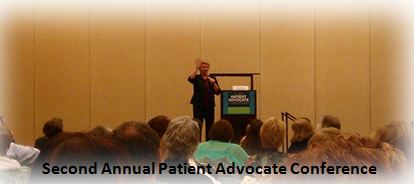Reflections After the Second Professional Patient Advocacy Conference
Aging Wisely team members Linda Chamberlain and Shannon Martin recently had the pleasure of attending and speaking at the Second Annual Patient Advocate Conference in Orlando, Florida. We were also pleased to be part of the first conference held last year, put on by the Professional Patient Advocate Institute, and honored to be named national award winner as a Patient Advocacy Organization. This year the conference was even bigger and a great opportunity to share our passion for advocating, care coordination and improving patient outcomes.

We thought we’d share some of the “take aways” that might be most relevant to our readers, particularly if you are a patient or family wondering if you need a patient advocate or related services.
- A common theme was the emergence of professional patient advocacy, i.e. how this role has become more necessary as our healthcare system has evolved. No matter your thoughts on our current healthcare system and changes coming to health care (or perhaps even what country/system you are involved in), there can be no doubt that things are more complex than ever. Even if only by the nature of our advancing knowledge, technologies and treatments, there is more for both medical providers and patients to understand (and decide upon) than ever before. An expert can be an invaluable partner in this process.
- It is not just the complexity of health care that warrants the need for a professional patient advocate, but the difficulty of facing chronic health issues or serious diagnoses. A couple speakers mentioned “world stop” moments such as getting a cancer diagnosis (or the call from a loved one about their diagnosis) and if you have had one of those, you know how the world can seem to change in a moment.
- Coordinated care improves outcomes. Common sense tells us this as patients and medical providers, and studies back this up with results. It is why we find medical providers referring to Aging Wisely after they have exposure to what our care managers help them (and the client/patient) accomplish. We talked a lot about this in our session on physician appointments, because it is many of the things that happen when the patient is outside of the doctor’s office that affect how successful any treatment plan will be.
- Patient advocates are good researchers and resource connectors. You don’t expect your patient advocate to know about every condition and shouldn’t necessarily be identifying the best patient advocate based on their expertise in a specific diagnosis but in how he/she can help you navigate care and identify the best experts. This is why, as one speaker reiterated, patient advocates do not necessarily have to be nurses, though many come from that background. Our Aging Wisely team operates very much on this premise, using a social services model to bring together resources and a coordinated systems approach. We pull together the best experts for you–whether it means bringing in a nurse consultant, locating specialists in your diagnosis or initiating a pharmacy consult.
If you are trying to determine whether you need a patient advocate, it is likely you are facing issues which would, at a minimum, benefit from a consultation. Some of the key points at which you should consider patient advocate services are:
- upon receiving a life-changing diagnosis (which could be an acute condition needing immediate treatment or surgery or a chronic and/or progressive condition),
- when experiencing symptoms and searching for a diagnosis or worrying that you may have been misdiagnosed,
- upon hospitalization (of self or a loved one) or transition to after-care,
- when issues arise in managing chronic conditions, coordinating care or pulling together resources to manage care.
Patient advocate services are both a service Aging Wisely offers and a part of all of the services we provide to clients. We can be your advocate and resource coordinator, from a simple care consultation to the invaluable assessment process through ongoing care coordination and insurance/Medicare navigation. Call us at 727-447-5845 to learn more or click below to request help. Our Care Consultant, Sue Talbott, provides a no-obligation needs and services analysis to help you locate the most appropriate options for you and your family!
 Popular Downloads
Popular Downloads


 Get Our Newsletter!
Get Our Newsletter! Mission Statement
Mission Statement

